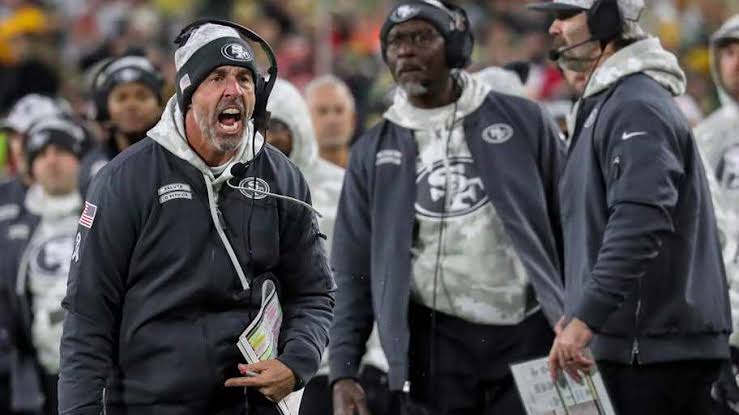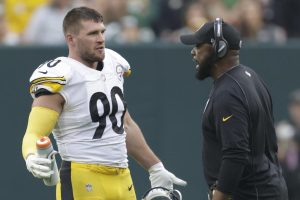
We will always be saddened to learn that the head coach of the San Francisco 49ers fired four outstanding players because of….. Read more
We will always be saddened to learn that the head coach of the San Francisco 49ers fired four outstanding players because of internal conflicts that fractured the unity of the team — conflicts that, in hindsight, might have been resolved with more patience, communication, and support.
When news broke that Coach Mitchell Harper had made the controversial decision to cut star wide receiver DeMarcus Holt, veteran linebacker Jason “J.T.” Thomas, defensive back Eli Briggs, and rising quarterback phenom Caleb Dawson, fans were stunned. These weren’t just players — they were icons in the making, cornerstones of a team that had made deep playoff runs in recent years. The locker room chemistry appeared strong, and their performances on the field had been electric. The move was, to say the least, shocking.
As details began to emerge, a different picture formed — one less about performance and more about personalities, leadership, and a fractured team culture. Reports from inside the organization pointed to a growing divide between a group of younger, outspoken players and the established leadership headed by Coach Harper and his senior staff. These players, while undeniably talented, had challenged decisions, questioned team strategy, and, according to sources close to the team, “created a culture of tension and mistrust.”
For fans, it was a painful reminder that the success of a football team isn’t built on talent alone. Even the most athletic and skilled individuals cannot carry a team forward if the spirit of collaboration and shared purpose is lost. Coach Harper defended his decision in a tense press conference, stating:
“This was not a decision made lightly. I care deeply about these men — not just as players, but as individuals. But I have a responsibility to this organization and to every man in that locker room to protect our culture. We lost games we should’ve won last season not because of physical mistakes, but because of a breakdown in unity. It’s my job to fix that.”
The cracks had been visible for months. Caleb Dawson, once dubbed the “future of the franchise,” had reportedly clashed with offensive coordinator Marcus Jeffries over the playbook, calling it “dated and predictable.” Teammates had taken sides, and the locker room, once a cohesive family, became a battleground of whispers and quiet alliances.
DeMarcus Holt, a fan favorite known for his flamboyant personality and viral touchdown celebrations, had also been reprimanded for missing multiple team meetings and for an explosive sideline argument with Coach Harper during a key loss to the Seahawks. Though his stats were impressive — nearly 1,400 receiving yards and 11 touchdowns last season — Holt’s commitment to team values had come into question.
Meanwhile, Eli Briggs and J.T. Thomas had become outspoken critics of what they described as “old-school coaching methods” that they felt were out of touch with today’s players. While some teammates agreed, others felt their attitudes undermined discipline and respect within the locker room. The divide was more than generational — it was ideological.
Behind the scenes, the 49ers’ front office had tried to mediate. Team psychologists and veteran leaders attempted to bridge the gaps, holding meetings and player-only gatherings to air grievances and rebuild trust. But the damage had already been done. By midseason, insiders said, it was clear that something had to give.
In the end, Coach Harper chose culture over controversy. In his words: “We have to be about the team first — always. No individual, no matter how gifted, can be above that.”
The backlash was swift. Social media erupted with criticism, with hashtags like #JusticeForCaleb and #BringBackDeMarcus trending for days. Fans felt betrayed. Jerseys were burned. Season ticket holders threatened to cancel their renewals. Local sports radio lit up with furious callers accusing the franchise of self-sabotage.
But not everyone was upset.
Former players and analysts came to Harper’s defense. NFL legend Charles Woodson said, “Talent gets you stats. Culture gets you championships. Coach Harper made a hard call, but I respect it.” Others noted that the New England Patriots under Bill Belichick had made similarly ruthless decisions in the name of team culture — and had six rings to show for it.
In the weeks that followed, something interesting happened. The team — now significantly younger and less experienced — started to rally. Second-stringers stepped up. Practice reports highlighted a newfound energy and focus. Quarterback Trey McMillan, previously an afterthought, began to shine in scrimmages. Wide receiver Jalen Brooks, once overshadowed by Holt, showed flashes of brilliance.
Coach Harper’s gamble, though controversial, began to make sense.
Still, for many fans, it will take time to heal. The departure of four stars under such murky circumstances left a mark on the fanbase and the city. San Francisco is a town that loves its sports heroes, and watching them walk away — or be shown the door — is never easy.
In time, perhaps, those players will find new homes and thrive elsewhere. Maybe Dawson will become the face of another franchise. Maybe Holt will dance again in the end zone, donning different colors. And maybe the 49ers will come to be seen not as a team that discarded talent, but as one that bet everything on unity, and won.
But today, there is still sadness. Because while the NFL is a business, and hard decisions are part of the game, the heart of football is emotional. We don’t just root for players — we connect with their stories, their highs and lows, their triumphs and mistakes. Watching them fall out with a team we love feels personal.
And so we remain saddened. Not because we doubt Coach Harper’s intentions, or even his decision — but because we saw what could have been. We saw sparks of greatness. And we will always wonder what this team might have accomplished, if only the unity in the locker room had matched the talent on the field.Would you like a shorter or longer version, or want it styled differently (like as a news article or emotional fan letter)?




